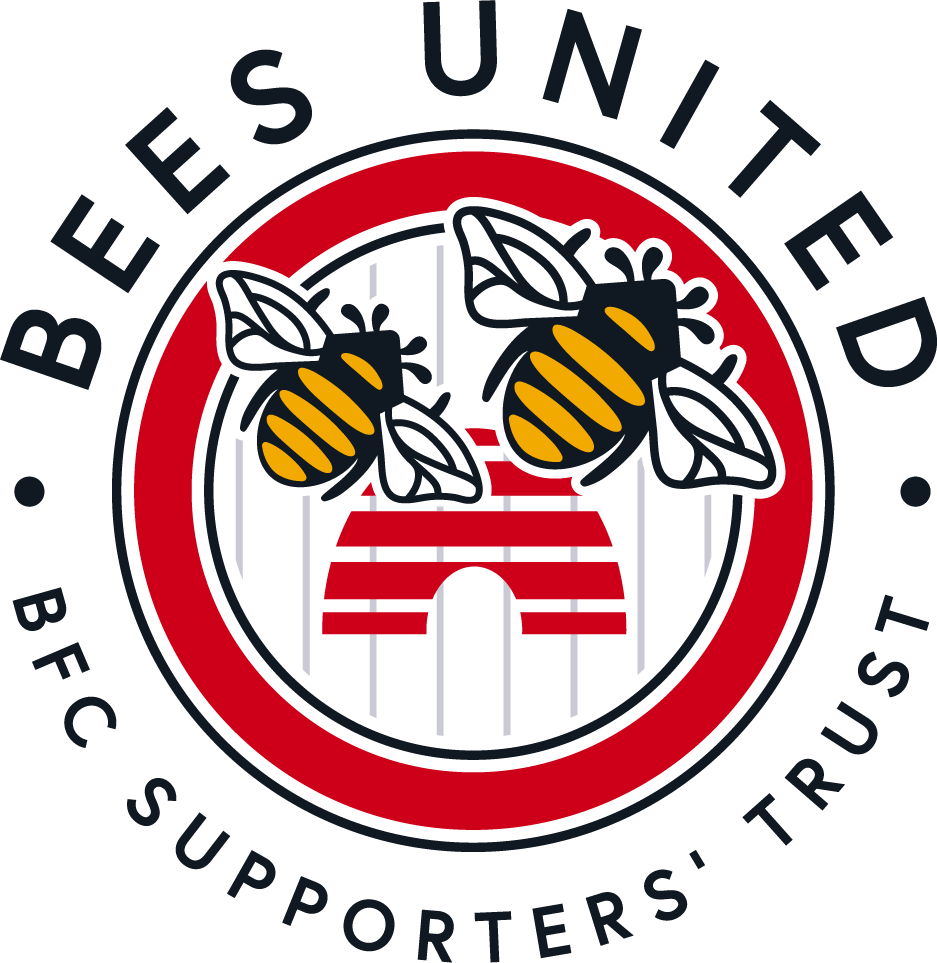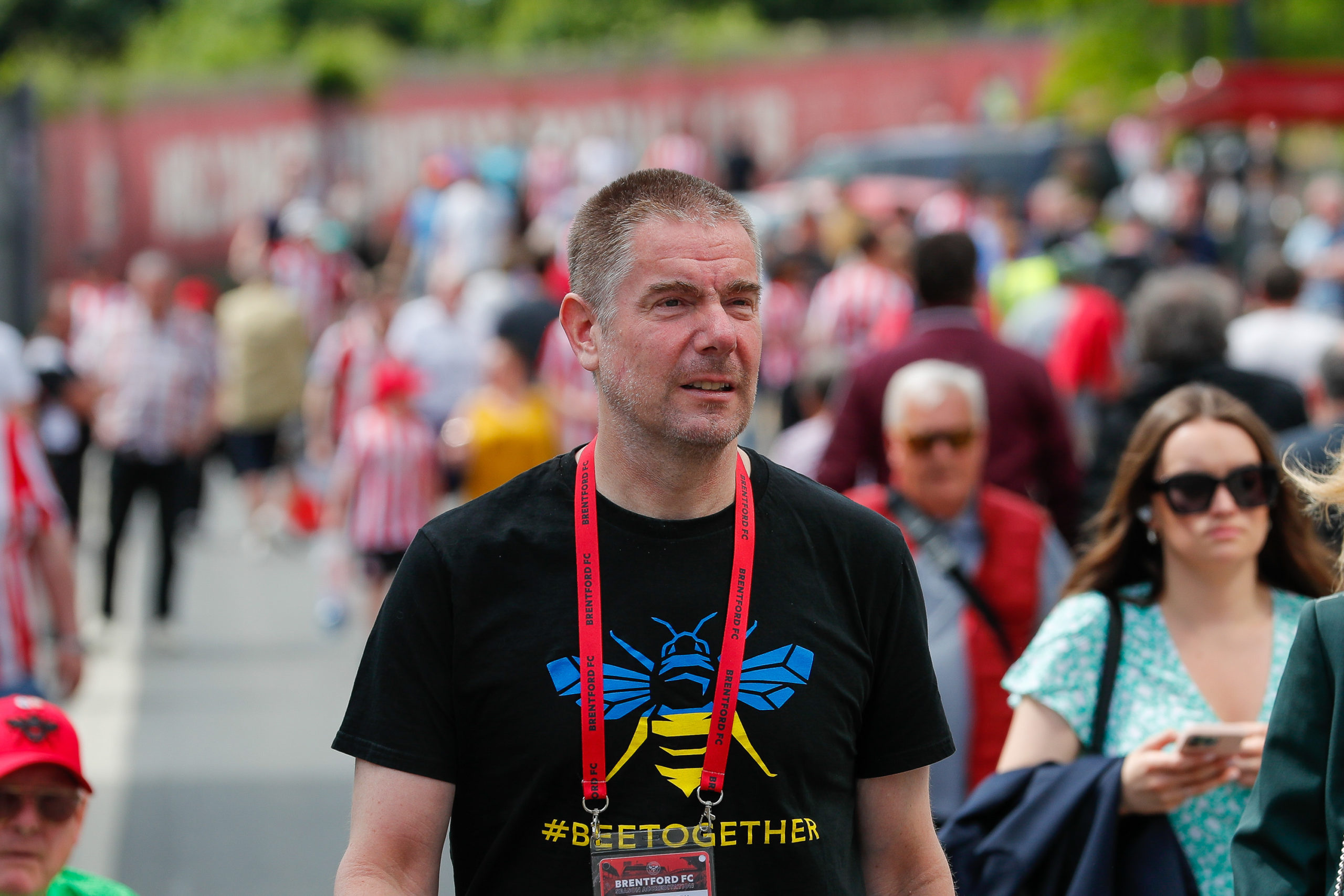SP On the 24th of May 2012 you sent a letter to the members of Bees United, it said “My commitment to the club is a serious one..As majority shareholders it is for you to make the best decision you can in the interests of Brentford Football Club”. Well they made that decision and I suppose they’d say that it turned out all right.
MB Yeah, absolutely.
SP And for you?
MB Yeah, it’s turned out pretty good. There’s been some bumps along the road. And sometimes it was more difficult than I anticipated. But pretty good position currently.
SP When did you first become a Brentford fan?
MB 1979 was my first game but I should admit I wasn’t a rock solid fan all the way, I’m not quite a lifelong fan. To give my complete history as a football fan: I’m from a completely non-football family. We were a cricket family. I grew up in Eton, my parents were teachers at the school but they sent me to Slough Grammar. I first got into football when I was eight in 1976. The first game I remember was Southampton v Man United in the Cup Final. For three and a bit years I was an avid Man United fan.
Then I went to my first Brentford game, I just went with friends and obviously Brentford were the local club. And then for a few years, I was massively into Brentford. I had a period for a couple of years where I was going to almost every home and away game while I was at school. There was a peak of my support for the club was when I was 14, going to Plymouth and Carlisle, you name it.
My interest in football waned a bit because I got very into cross country running. And also I lost touch with the friends I’d been going to Brentford with. After a couple of years in the mid 80s, when I was in the sixth form and the start of university. I started going to Man United games again, just because I had a couple of Anglo-Irish friends from Slough who are avid United fans, so we started watching their games.
And then in the late 80s, I reverted back to Brentford. But really leading up to 2005 my fandom had lapsed somewhat. Brentford was my team, but I was watching them myself a couple of times a year.
SP You once said that you first made contact with Brentford after reading an article in The Independent newspaper in 2005. In their archive there is an article by David Conn and he wrote that Bees United, who were then the majority owners of the club, “are desperately seeking a few wealthy supporters to invest, to enable them to pay off Ron Noades and get ownership of the club”. Is that the context in which you first got involved?
MB Yes that was the context and the thinking for the first few years was just put a bit of money in and but not be involved day to day, just peek behind the scenes. You know, I was anonymous for a little while, described as a ‘mystery investor’. And then it gradually got to the stage where as I put more and more money into it, I sort of naturally wanted more of a say in how things were run and were going to be run, it just seemed a natural thing.
SP At one point back then, you asked yourself whether this was business or charity? You said at one point, it’s somewhere in the middle?
MB I would still say yes, somewhere in the middle.
SP So The Independent article planted the seed that you could be involved, you started loaning the club money anonymously but you didn’t really have any measure of control. In fact, almost the opposite. By 2009 you’ve put in 4.5 million pounds in interest free loans. That’s a significant amount. But Brentford was still losing half a million pounds a year for some years. In fact you doubled down in 2009 offering to put in more money in return for a partnership deal with BU that offered the potential for you to own the club outright five years later.
MB I think at that point, it was kind of more towards the sort of charity end of the spectrum. And as the sort of investment grew over the years, it became gradually more to the business end.
SP You wrote in 2009 “I am offering to invest substantial sums of money into the club in order to help Brentford to become a Championship team”. Interesting that you said Championship at that point rather than Premier League.
MB Because Premier League at that point would have sounded a bit silly. Championship seemed simpler, a natural target because we’d had that single season in 92/93.
SP The 2009 deal gave you the chance to take complete control in 2014 but in 2012 both sides decided to do it sooner. The vote in favour at the meeting in St Paul’s Church was said to be unanimous amongst those there. Of the 450 postal votes, there were just four votes against. So the official record is that the decision was ‘almost unanimous’. A few years earlier you had told a meeting of Bees United members that if the then Chief Executive of your company Smartodds had been advising you on the deal, then from a purely business point of view he would probably have told you not to get involved. Were there were ever doubters at Smartodds ?
MB Not necessarily doubters, but we all realised at that stage what sort of investment it was. For a long time I kind of bought into the common view that a football club can’t possibly be profitable. So therefore it’s just about keeping things ticking along and try not to lose too much money. But then, actually, quite soon after in the summer of 2013, there was a new Premier League TV deal. And it became apparent to me that it would actually be possible to run a club sustainably, at breakeven, just on the football side because there was so much money flowing into the game. And there was probably going to be, you know, inefficiencies in transfers.
We were in League One and I know that it’s fashionable now for clubs in League One and League Two to say,’ Oh, the Premier League, they’re killing us. We will be so much better off if there was no Premier League’. But at the time I took the view that this was going to be a good thing for us, because indirectly, we’d be getting our hands on some of that money, because there’ll be a lot of money spent on transfers. It seemed that money going into the transfer market would help shrewd lower League clubs.
There’s quite a nice irony here. There was the new TV deal and Dwight Gayle was transferred from Peterborough to Palace in the summer of 2013. At the time I think Peterborough were at the bottom of the championship. Gayle was transferred for a very big fee and I remember thinking, wow, that’s crazy. This TV deal has really distorted the market? So there’s potentially going to be some opportunities here. And the great irony there was, at the time, I was thinking wow, that’s crazy. But what Palace paid for a Peterborough striker was almost identical to what we ended up paying for Ivan.
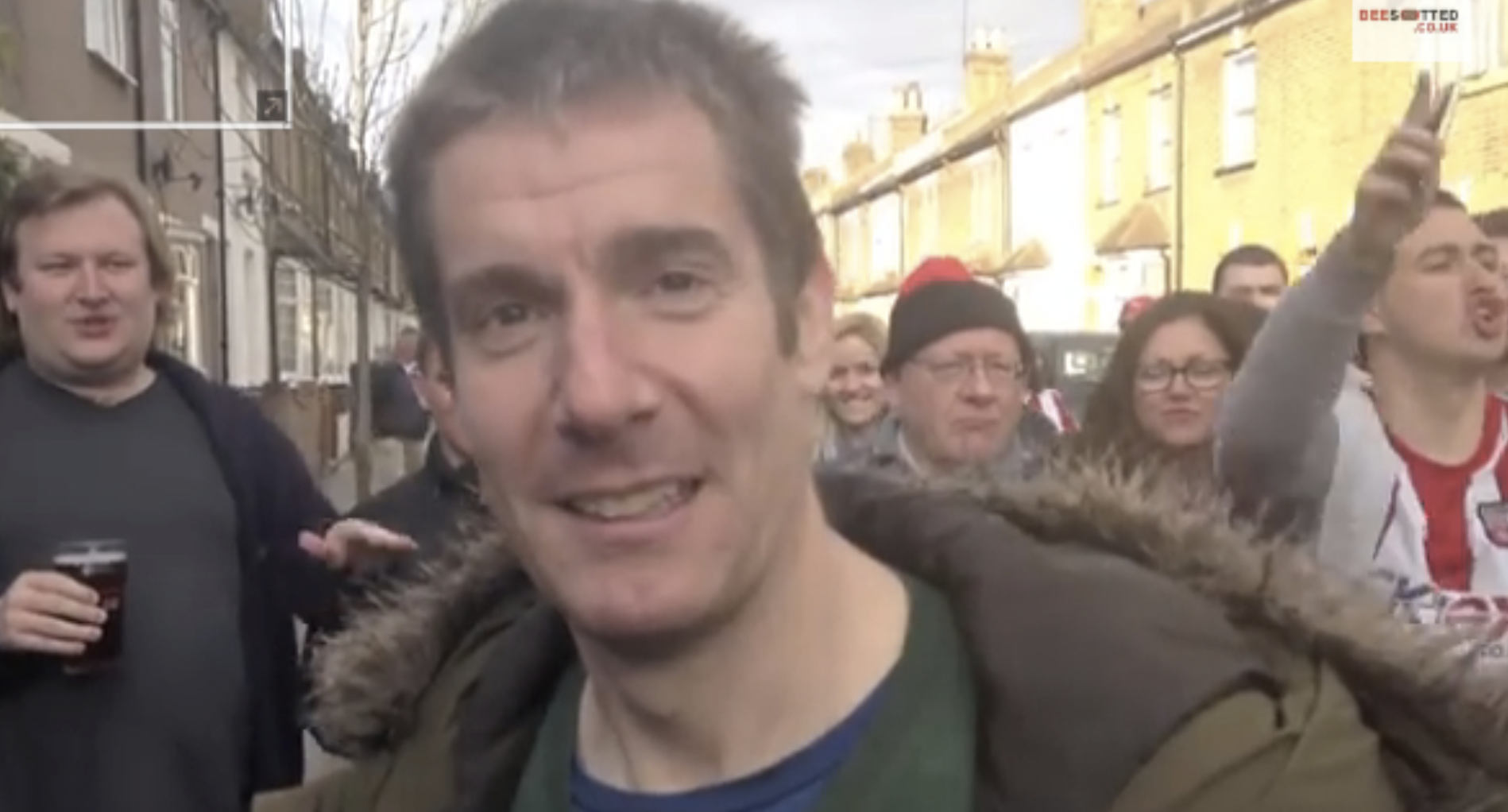
With fans outside Griffin Park (picture from Beesotted)
SP Now, some people have wondered whether given your background in the City and in the markets you were working in, there was a kind of intellectual challenge here. In some ways your businesses were based on out thinking conventional wisdom. You had out thought the bookmakers, was there an element of you out thinking the football establishment?
MB Yeah, a little bit. I think that across all markets, you always have a period where things are so inefficient. And what is generally accepted as true by the media and the public isn’t necessarily true. Then things get progressively more and more efficient. We’ve seen that massively in betting. Betting markets are just way, way, more efficient than they were 20 years ago. And we’ve seen that in the football transfer market as well.
SP It’s an interesting word ‘efficient’. Obviously, most people think of it as things like trains running on time, but it seems to mean much more than that to you. How would you define ‘efficient’ ?
MB Efficient is when market prices are close to what I would think is fair value.
SP So this opportunity was to find value where others hadn’t found it, particularly in the transfer market. You could find players and you could increase their value. Was that part of it?
MB Yeah and again in the same way as the betting market it just gets more efficient every year. I mean in January 2014 we bought Tarky (James Tarkowski) when he was 21 from Oldham. And that was like 325 grand or something like that. You don’t get stuff like that anymore. But in in the early days if we wanted to fish in the lower leagues, we didn’t have that much competition then.
SP Going back to the documents for the meeting with Bees United members in 2009 there’s almost a master plan and it all came true. So Number one on the list is recruitment of better players. Number two is better off pitch management. Number three is ‘fully support the move to a new stadium at Lionel Road’. Number four is a good relationship with the manager. Number five is an interesting line: ‘I do believe I may be able to bring expertise to help the manager identify players or potential value to Brentford’. Number six, “I recognise the community side to the club’. it’s a pretty good description of the way it all turned out, isnt it?
MB Yeah, pretty much. I suppose point five was because we still had the traditional English model, where the manager is your Fergie or your Cloughie, a combination of head coach, director of football and owner, all knowing, all powerful. And basically, the actual owner, his job is to keep his mouth shut and write the cheques. Eventually at Brentford we moved away from that model.
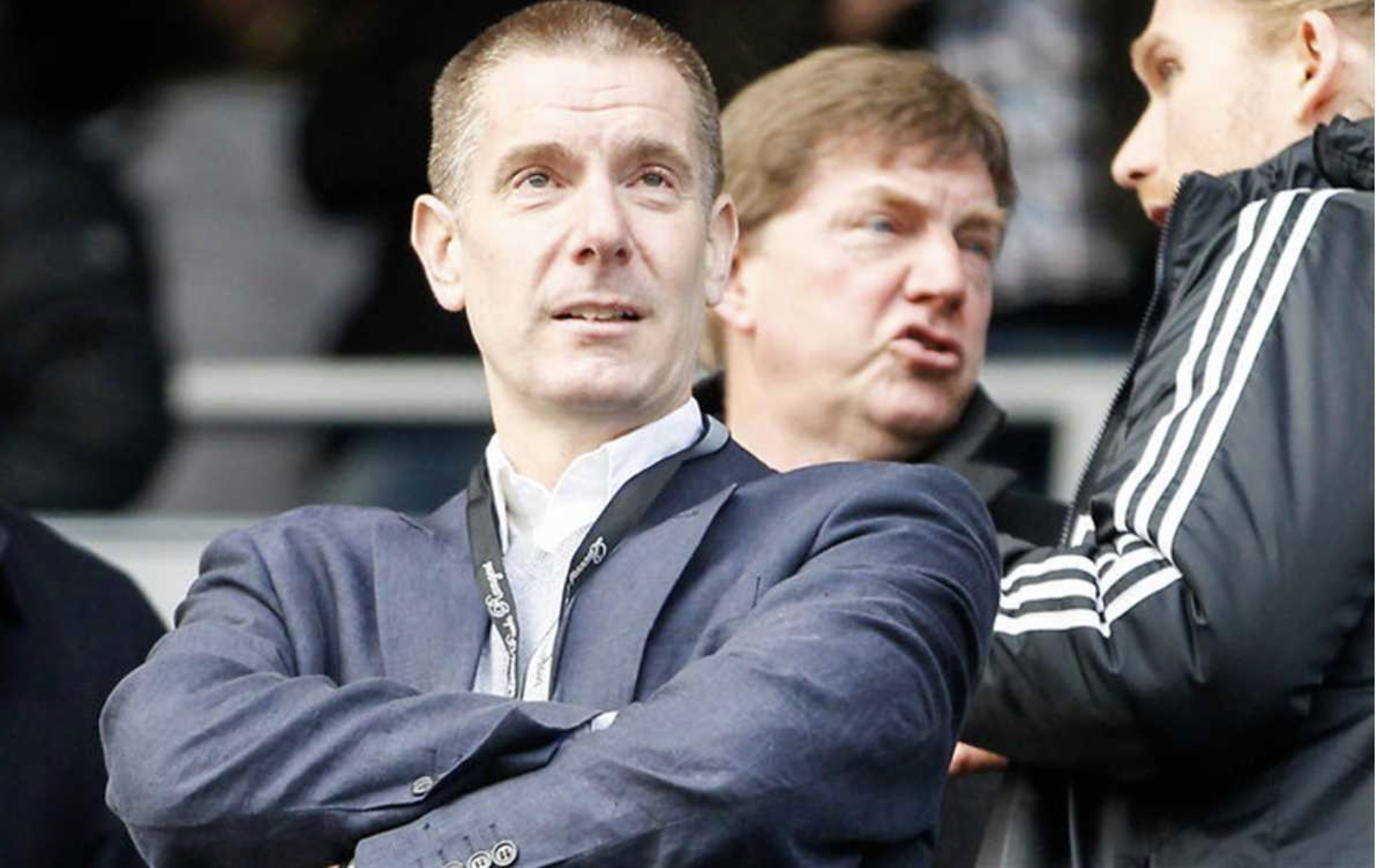
At QPR away in 2016 (picture from Mark Fuller at officialbfcpics.co.uk)
SP There’s an amazing documentary about QPR in 2011 where one of the then billionaire owners runs down to the dugout to tell them to change the team at halftime. Owners had got the reputation that if they were actually interested in the football, their influence was not going to be for the benefit of the team. So you were challenging quite a big norm by saying you could help the manager?
MB It’s a specific norm in English football or it has been over the years. So for example, when he was at Liverpool Brendan Rodgers wanted full control of transfers. And instead they introduced this infamous transfer committee. The club got absolutely slammed by the media that this is absolutely wrong. In England there has been this tradition that the manager is all powerful. Basically I’ve always been of the opinion that decisions are best made not by all powerful leader, but by consensus. Not by ‘groupthink’ where everyone just agrees but where you have a group in which everyone is allowed to have their own independent thoughts, there’s vigorous debate and decisions aren’t weighted by the seniority of the person giving their opinions. I would say, for a long time, the media presented it as this binary option either the owner just writes a cheque and keeps his mouth shut as he should, or it means he’s interfering in absolutely everything and he’s running down to the bench at halftime. The fact that I didn’t want to be in the former camp meant that there was lots of crap about me trying to dictate team selection and so on.
SP Brentford fans, being so used to the old model, are probably not quite sure how it actually operates now. You may be more involved than they realise. And therefore, it could be argued you don’t quite get the credit for what you have done on that side.
MB No, it’s probably the opposite that is true. I’m probably less involved than people think. Certainly in terms of the ‘maths’ that got really exaggerated. At the time of ‘Village gate’ (the departure of Mark Warburton) we were caught on the back foot. We felt we had to say something. With hindsight we should have just said absolutely nothing. But we felt we should say something so we made this point about mathematical models. The funny thing is that when we were talking over this press release, we said if we put this in, they’re going to write ‘oh so they’re only using maths and no humans’ so we’re going to make it absolutely clear, as clear as possible, but there will still be traditional scouting. That made absolutely no difference. We still got slammed for dispensing with our traditional scouts. I’d say it was always exaggerated how much maths was going to be involved. But having said that, I would have anticipated that our models would have had more impact than they actually have. So I’d say instead, the big change hasn’t been such so much that but more that it’s now a collaborative effort rather than the tradition that a manager says ‘I want to sign this guy because he used to play for me and I trust him’. The other most common lines are ‘I know him’ or ‘we share the same agent’ or ‘I saw him on TV the other night, and he had a really good game’. So I think the really big change is that it’s a more collaborative effort. Lots of different people having input.
SP You would be allowed a smile if you reflected on the difference between the man who issued a bonkers press release about maths and the man who is now heralded as the genius who decided to use maths.
MB I think we all got a bit caught up in it. The first few months after that there were press releases blathering on about analytics and all of that. And then we quickly realised ‘shit, this is getting out of hand’. And so ever since then, we’ve been trying to downplay all the sort of ‘Moneyball’ nonsense, But generally, it’s much more qualitative than quantitative.
SP Qualitative as expressed in traditional scouting as well as the maths?
MB Yes traditional scouting albeit a little bit more video scouting than live scouting. We do some live scouting, I get it that in the flesh you can see more, but if you’re considering an overseas player then for the time it takes to go over there and watch him, you could have watched 10 matches on video, especially if you’re just watching that player’s actions.
SP This also takes us to the change in the Brentford structure from a Manager to the Directors of Football plus a Head Coach. Do you think you stuck with that manager model too long?
MB Maybe, I mean, we did have what I’d call a ‘Director of Football lite’, because obviously from the summer of 2011 we did have a Director of Football. But English football and English media have hated the concept of a Director of Football and if they’ve tolerated it at all it’s Director of Football lite, which is that he is subordinate to the manager. He reports to the manager rather the other way round, he sees himself more as the manager’s recruitment assistant.
SP So Mark Warburton was the Manager and Frank McParland was the Director of Football. You decided that by having Phil Giles and Rasmus Ankersen as Directors of Football working with you that was going to be better.
MB Yes. I tried to say at the time it wasn’t that controversial because if you look to all professional team sport, anywhere else in the world, apart from football in Britain, this is the model you had whether you call it a general manager, sporting director, director of football. You had someone at the head and then all the departments reports. The head coach is chosen because he’s an excellent coach. I should also add even though I had myself, cynicism about your manager saying ‘Oh, I like him because he’s, he’s played with me before’ obviously with Deano (Dean Smith) we bought in Rico and Romaine. Then with Thomas we bought in a million Danes including Nørgaard and Eriksen. So maybe I’m not as anti that concept as I was. Having said that, pretty much all of those players we would have gone for anyway. Eriksen probably not. And Roerslev we probably wouldn’t have either.
SP When Roerslev was at FC Copenhagen he was sent out on loan to clubs where he didn’t get many games. He was sent back to FC Copenhagen and I think Brian Riemer knew him. And that’s about it.
MB Yeah, that was it. So the fact is that he was promising at youth level, but then his first outing as a pro hadn’t worked out. In normal circumstances, we wouldn’t have gone with him. I really, really liked Nørgaard, would have definitely signed him direct from Brøndby. But then because of the fact that it didn’t work out for him at at Fiorentina I would have been somewhat sceptical. It was really interesting hearing his interview recently about why it didn’t work out. It started with his head coach saying, ‘Oh, you’re from the Swedish League, aren’t you?’
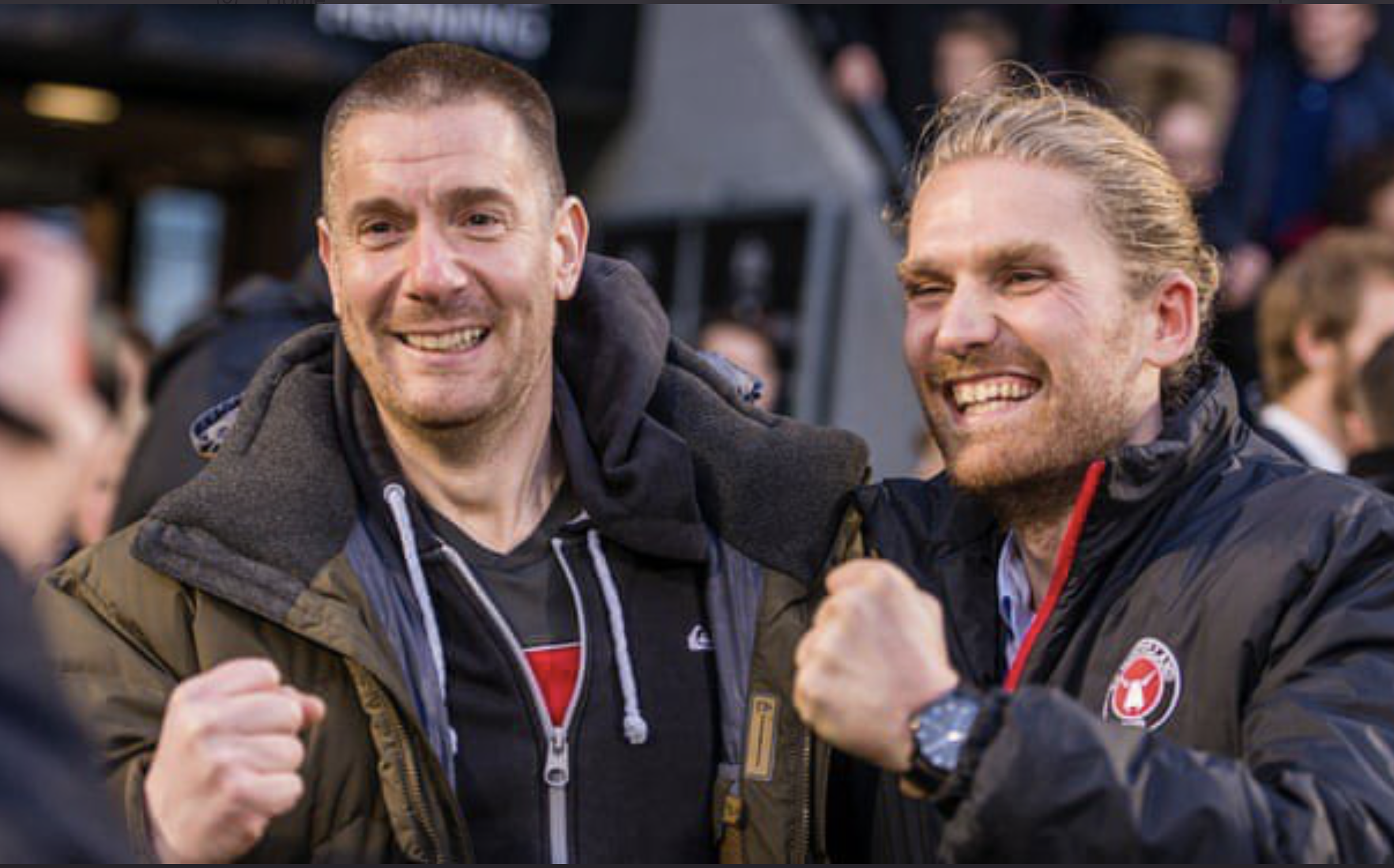 Celebrating Danish Superliga success with Rasmus Ankersen at FC Midtjylland
Celebrating Danish Superliga success with Rasmus Ankersen at FC Midtjylland
SP Now we’re talking about Danes I should ask about where FC Midtjylland fits into this. There’s a belief that you consciously bought Midtjylland in 2014 to try out your ideas. But the other version is that after you bought it you saw things that you thought might be of use to Brentford. Which is it?
MB It is neither. It was partly that I’d met Rasmus in about March 2013 and we just hit it off instantly in this sort of football geek nerd way. Some of the things he thought were music to my ears. At that time at Brentford the general culture and environment across the entire club wasn’t as receptive to new ways of thinking. So at that point I was thinking, I’ve got various ideas some of which worked, some of which didn’t work. And if I could I would have put them in place at Brentford. The thing about Midtjylland was, they would have probably gone out of business if I hadn’t got involved. So it was very easy to walk in the door. Okay, I’m the new owner, but you’ve got to try out all this new stuff. And let’s face it, their culture is a bit more open minded. They have much less hierarchy or much, much flatter. So anyone can state their opinions whereas there’s elements of English football, which are more like, in the 70s, ‘know your place; etc.
I think in terms of mistakes I made back then if you look at personality profiles, apparently mine and Ras’s are both yellow, that’s restless, let’s change things whereas Phil is way more calm and measured. There has to be a process, a structure. We have to do this bit by bit.
SP What colour does that make him?
MB I think blue, they say he’s very, very much into process and structure. And keeping everyone on side.
Next Month; the ups and downs in the journey to Lionel Road, wishing those play-off finals ’would just end’, losing Ollie and selling Said, life in the Premier League, signing Eriksen and the future of the transfer market.
